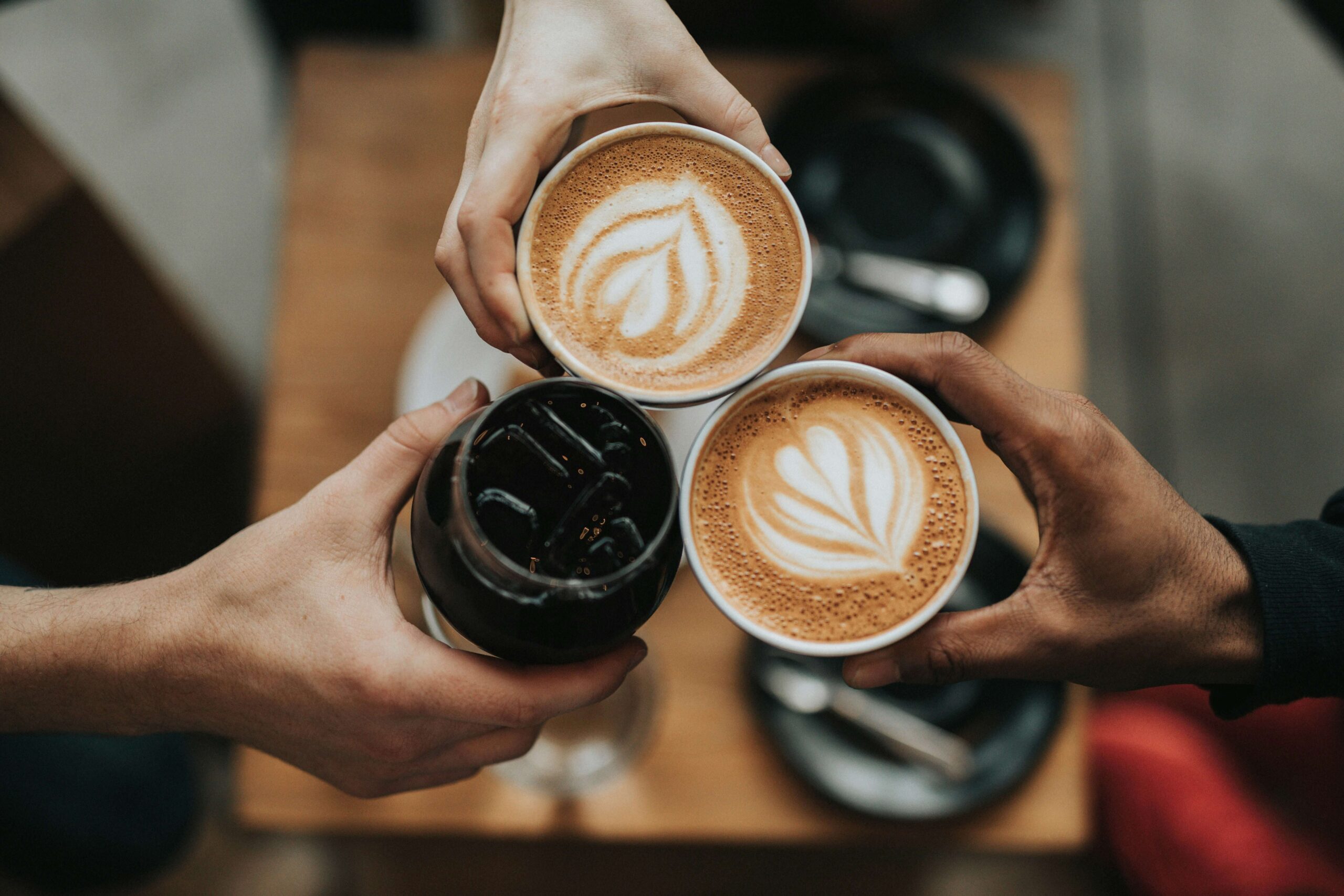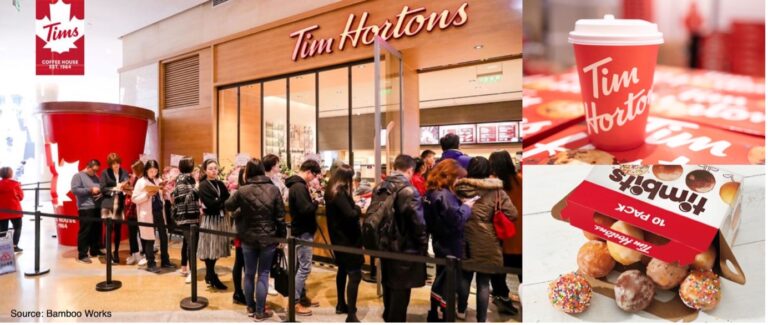Within the vibrant coffee culture of China lies a fascinating tapestry woven with diverse preferences, evolving trends, and distinctive consumer tribes. Embarking on an exploration of this dynamic landscape unveils the latest insights, trends, and taste preferences of coffee consumers in China.
From the gradual ascent of coffee consumption to the emergence of distinct consumer tribes and the transformative evolution of coffee shops into multifaceted hubs, this journey promises a comprehensive overview of the rich and ever-evolving coffee culture sweeping across the nation.
Download our China’s F&B industry white paper

Growth of coffee consumption in China
While coffee consumption in China has steadily increased, it isn’t a daily habit in first-tier cities. Our surveys from Chinese residents indicate that only 54.2% of respondents consume coffee more than once a week.
For Chinese coffee consumers, it appears that coffee convenience supersedes coffee quality: while the majority of consumers emphasized coffee quality as the primary factor for a coffee shop, instant coffee (27.9%) and bottled coffee (21.3%) were more popular among respondents in comparison to coffee shop coffee (18.6%).
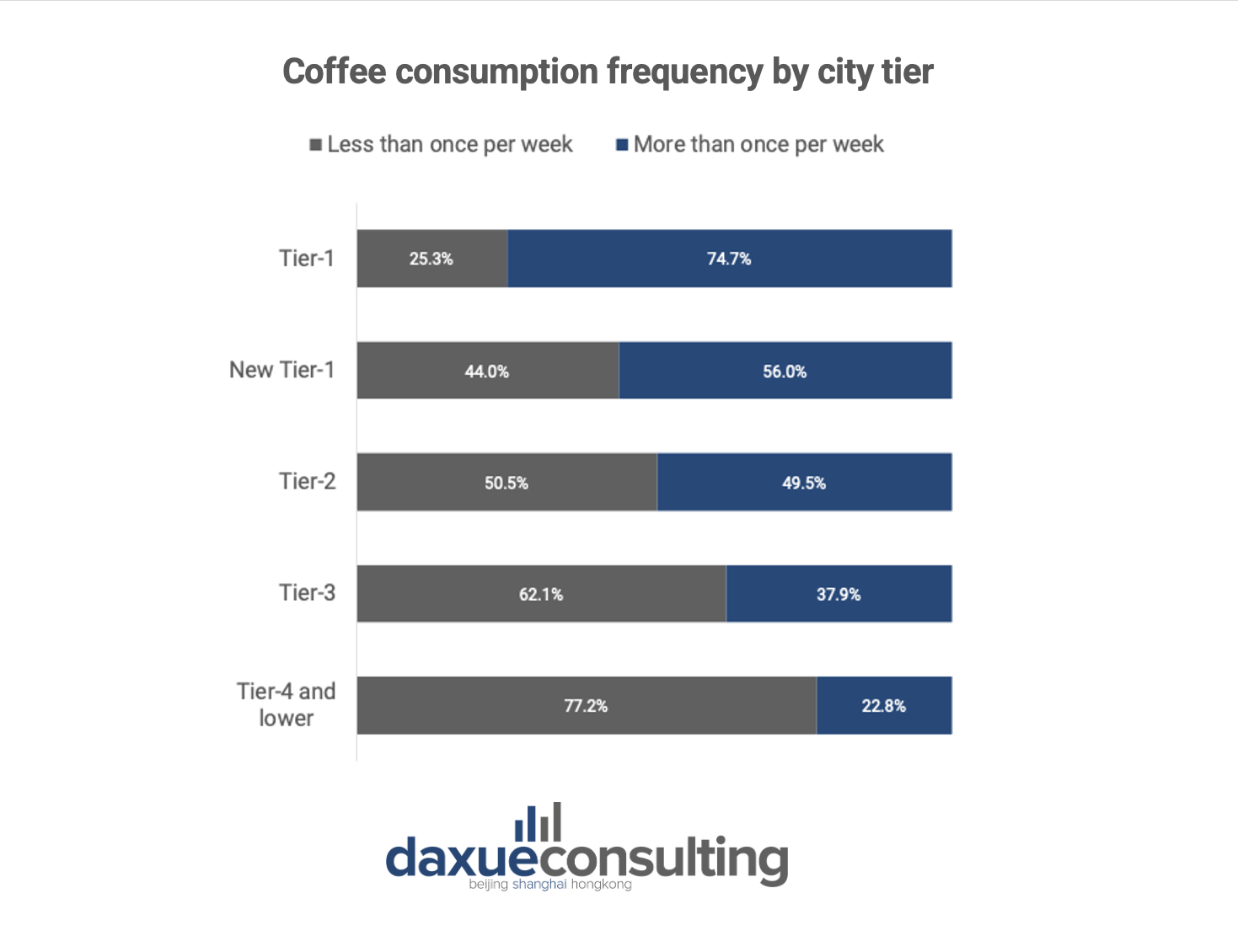
Source: Daxue Consulting, an increasing weekly frequency for coffee consumers in China as they inhabit higher-tier cities.
In lower-tier cities, demographic factors wield significant influence over consuming coffee and cafe preferences, with an emphasis placed on flavours and ambience. Conversely, the younger Gen Z demographic prioritizes price, environment, and location, while coffee drinkers aged 41-59 exhibit a preference for unique flavours and innovations. These distinctions underscore the nuanced considerations shaping consumer behaviour across different age groups and geographical locations in the coffee industry.
Different consumer tribes based on coffee preferences and lifestyle
The evolution of coffee culture in China has given rise to three distinct consumer groups, known as tribes, each with its unique preferences and habits. Firstly, there are fitness enthusiasts who prioritize coffee for its caffeine content, seeing it as a tool to enhance their workout performance. They often opt for black coffee due to its high caffeine and low-calorie properties. They are often seen purchasing ready-to-drink coffee from popular coffee chains.
Then there are the flavour adventurers, who seek novelty and unique experiences in coffee. They enjoy exploring boutique coffee shops and trying innovative flavours of freshly ground coffee beans, often driven by social media trends like “cafe visits.”
Lastly, there are lifestyle enthusiasts who value quality of life and refinement. Inspired by lifestyle bloggers, they incorporate coffee rituals into their daily routines as a symbol of their commitment to a more refined lifestyle.
Fitness enthusiasts and healthy black coffee
The majority of fitness enthusiasts, typically aged 20-35, are found in tier-1, -2, and -3 cities and come from diverse backgrounds such as students, white-collar workers, models, fashion bloggers, and fitness enthusiasts. They exhibit low coffee brands loyalty, prioritizing convenience over taste quality and creativity in their coffee choices, and are relatively insensitive to price or environmental factors.
Their lifestyle habits often involve vlogging, cooking, and fitness activities. Key coffee brands catering to this demographic include Yongpu, Luckin Coffee, and Saturnbird. In particular, Saturnbird is well known in the Chinese coffee market for its vibrant pod-packaged instant coffee with various roast options. They’re also renowned for their collaborations with fitness-related brands like Snowline, aligning well with the on-the-go and sporty lifestyles of fitness enthusiasts.
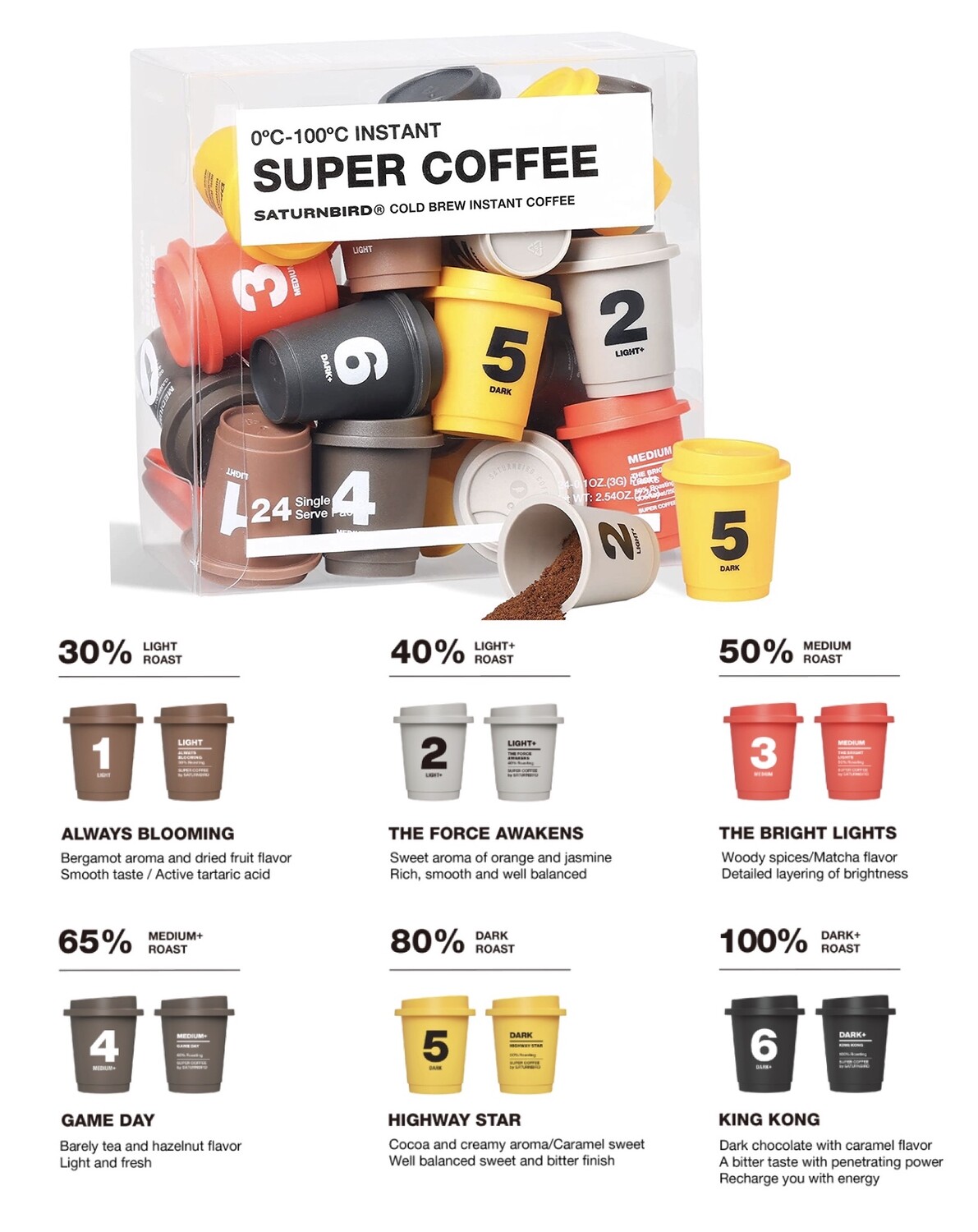
Source: Saturnbird, key features of each coffee roast, varying in roast
Flavor adventurers and their ambitious taste ventures
Originating from the rapid proliferation of boutique coffee shops and the continuous innovation of flavours, “café visits” have surged in popularity on social media since 2018, with over 4 million posts on Xiaohongshu dedicated to the trend as of January 2024. Notably, Shanghai boasts an impressive 8,530 coffee shops as of December 2023, ranking it first globally.
This dynamic environment fuels the enthusiasm of flavor adventurers, who eagerly explore different coffee shops for the ambiance, concept, or taste. They view coffee consumption as a holistic experience beyond just the beverage itself. This group, typically comprises of students, white-collar workers, and bloggers/vloggers, exhibits low brand loyalty and places less emphasis on taste quality, instead prioritizing creativity while remaining price-insensitive but environmentally conscious.
Their lifestyle revolves around fresh coffee, food, photography, and seeking out experiences, often documented and shared on social media platforms. Top products favoured by flavor adventurers include Luckin’s Moutai latte and Yongpu offerings.
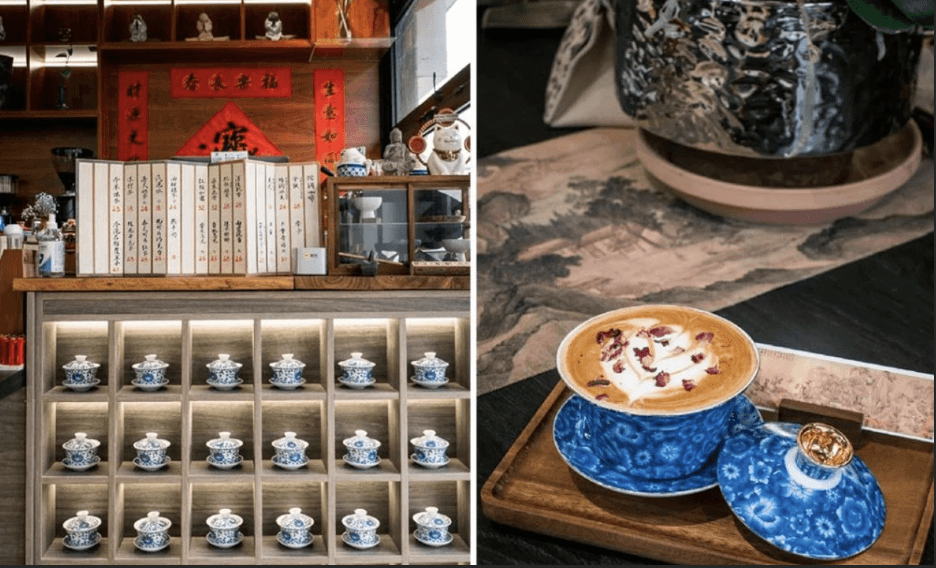
Source: Xiaohongsu, a coffee shop in Zhangjiagang that serves coffee in addition to tea tasting, pottery making, and guzheng performances that provide an overall unique atmosphere
Lifestyle enthusiasts and coffee as an art form
The rise of lifestyle enthusiasts can be attributed to the significant influence of lifestyle bloggers on social media platforms. These bloggers, often seen sharing their daily routines through vlogs covering various topics like #get ready with me, #travelvlog, and #dailyvlog, have spurred interest in a lifestyle centered around coffee consumption and establishing daily rituals.
In contrast to flavor adventurers who prioritize novelty and in-store experiences through café-hopping, lifestyle enthusiasts focus on refining their daily routines. This demographic, primarily composed of highly educated, female white-collar workers residing in first-tier cities, views brewing a daily cup of coffee as a symbol of their pursuit of a more refined life.
Influencers such as @是当归哦 (Angelica), boasting over 1 million followers on Bilibili, and Livec_董小姐, with over 253,000 followers on Xiaohongshu, play pivotal roles in embodying and promoting this lifestyle. They often share content revolving around coffee making, brunch preparation, shopping experiences, fitness, and fashion, with a significant emphasis on rituals and enhancing the overall quality of life.
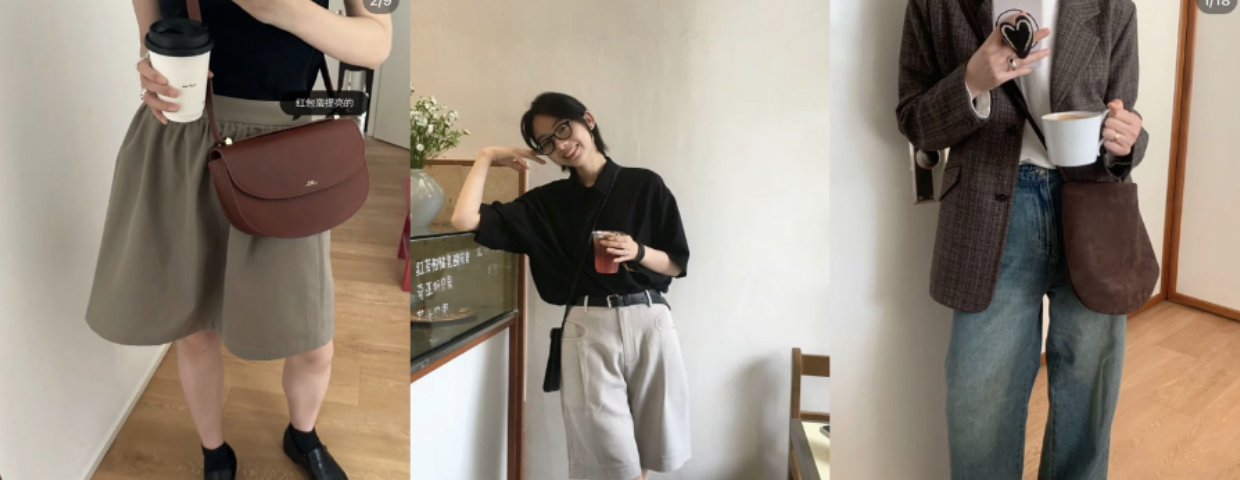
Source: Xiaohongshu, Livec_董小姐’s posts as a coffee lifestyle enthusiast
This tribe consists mainly of 25-35-year-olds with occupations ranging from housewives to white-collar workers, bloggers, and vloggers, exhibits preferences including low brand loyalty, a high emphasis on taste quality and creativity, along with low price sensitivity and moderate concern for environmental factors.
Transforming coffee culture: from digital nomad havens to day-to-night trends in China
Coffee shops have undergone a notable evolution in recent years, becoming essential hubs for digital nomads, freelancers, and students in pursuit of productivity. This transformation is evident in the customized atmospheres of these establishments and the widespread use of hashtags like #适合办公的咖啡馆 (“Coffee shops suitable for work”) on Xiaohongshu.
Coffee shops in China: transforming into productive havens
For coffee consumers in China, coffee shops have undergone a significant transformation, evolving into havens for digital nomads, freelancers, and students seeking productive environments. This shift is evident in the rise of coffee shops tailored to this demographic, as demonstrated by the popularity of hashtags like #适合办公的咖啡馆 (“Café suitable for work”) on Xiaohongshu, a Chinese social media platform, garnering 4.6 million views. These establishments now serve as incubators for creativity and productivity, offering amenities such as accessible power outlets, self-service water stations, and high-speed Wi-Fi.
These trends not only mirror changing consumer behaviours but also foster the development of unique communities within the coffee culture. By providing spaces conducive to focused work, coffee shops have transcended their traditional role and become integral parts of many individuals’ work routines.
This shift highlights the growing demand for flexible and adaptable spaces catering to the needs of modern workers and students, just like it’s evident in the mature coffee markets. Consequently, coffee culture has evolved to nurture communities centered around shared objectives of creativity, productivity, and collaboration.
Coffee in the morning, alcohol at night: an emerging trend
The hashtag #早C晚A, originally associated with the skincare routine of using vitamin C in the morning and vitamin A at night, has undergone a significant reinterpretation. It now symbolizes “Coffee in the morning and alcohol at night,” reflecting a cultural shift that gained momentum in 2021 and peaked in 2023. This trend resonates with young professionals who rely on coffee to kickstart their workdays and turn to alcohol for relaxation in the evenings.
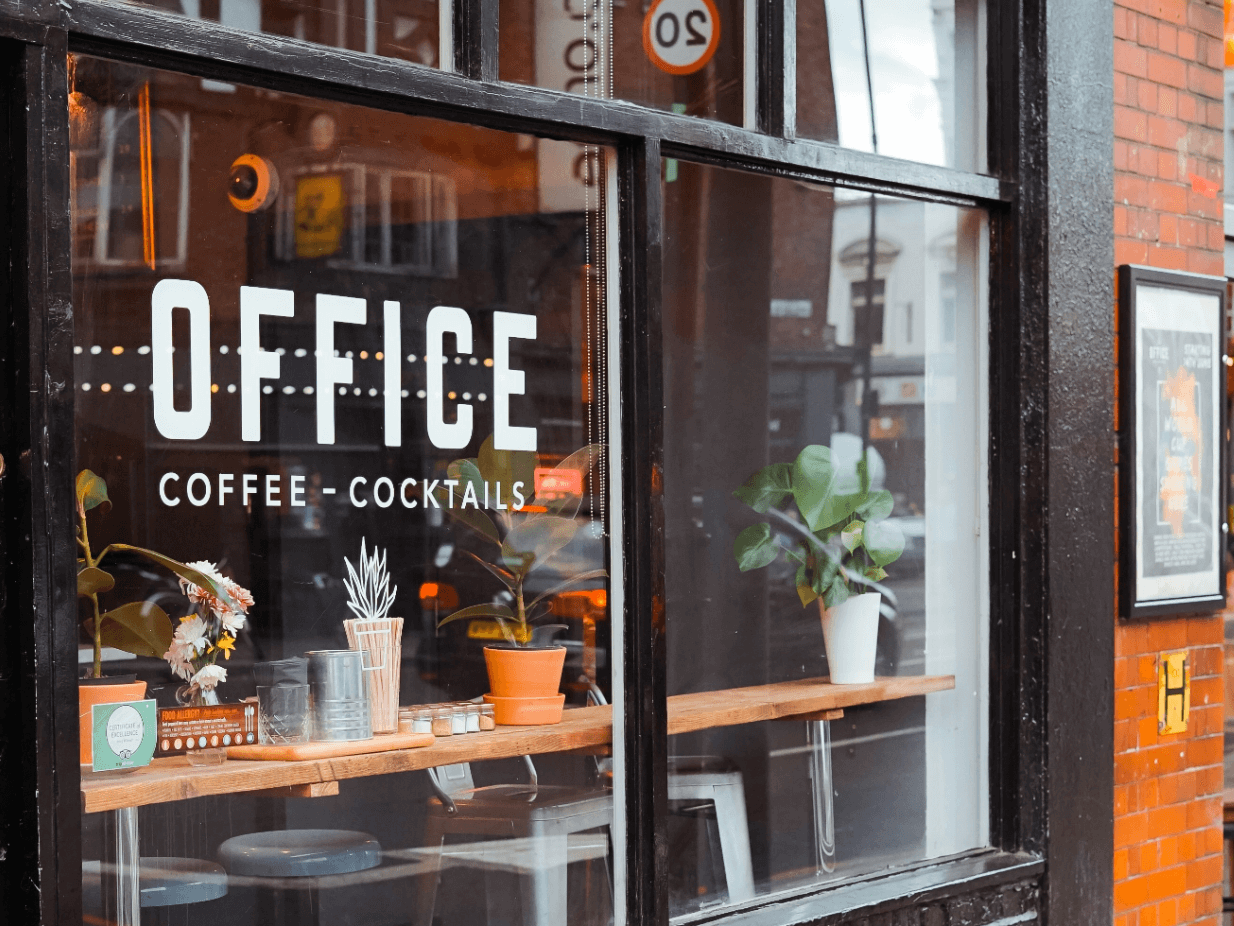
Source: pandasome, a Chinese cafe that offers both coffee and cocktail
Chinese consumers’ changing preferences in coffee consumption: key takeaways
- Coffee consumption in China is increasing slowly, but it’s not yet a daily habit for people. For consumers in general, convenience supersedes the quality of coffee.
- Coffee shop preferences are demographically dependent: lower-tier cities emphasize flavor and ambiance, while younger consumers are more price-sensitive.
- Three distinct consumer tribes have emerged in China’s coffee culture: fitness enthusiasts, flavor adventurers, and lifestyle enthusiasts, each with their own preferences and habits.
- Coffee shops in China have evolved into productive havens for digital nomads, freelancers, and students, with customized atmospheres and amenities like power outlets and high-speed Wi-Fi.
- The emerging trend of “Coffee in the morning, alcohol at night” (#早C晚A) reflects the adaptability of urban coffee shops to cater to diverse consumer demands throughout the day, as they transform into lively bars after sunset to meet the preferences of young professionals.
Cultivating success in China’s coffee market: strategic insights for brands
As coffee consumption rises in China, understanding the evolving preferences and trends is crucial. At Daxue Consulting, we specialize in the dynamic coffee market, offering tailored analysis and strategic consulting. Our expert insights help brands effectively engage with diverse coffee consumer tribes, from quality-seekers to convenience-focused drinkers. Equip your business with our in-depth market understanding to successfully navigate and grow in China’s burgeoning coffee sector.
Contact us to discuss your next project in China.



